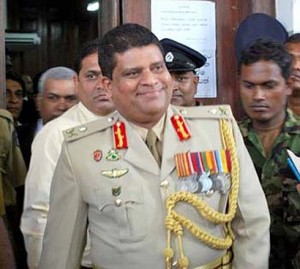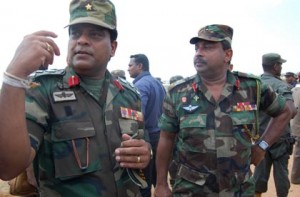Scapegoating of a General
Indignation over Shavendra
There is indignation in Sri Lanka at the fate that has befallen General Shavendra Silva who has been served with summons in the United

Major General Shavendra Silva is seen here in November 2010 after giving evidence before the Trial-at-Bar against former Army Commander General Sarath Fonseka on the White Flag issue. In his evidence Silva said that not a single LTTE cadre or civilian was killed during the Vanni humanitarian operation. The Army received them as Sri Lankan citizens he is reported by local media to have said.
States where he is representing his country as a diplomat in the United Nations. He is faced with both a case against him as a representative of the Sri Lankan government which has allegedly committed war crimes, and also with a civil action for the same reason. When he led his troops from the west coast of the Northern Province to the east coast General Silva was in the news almost every day and for about two years there was no assurance of his success or whether he would come out of the battle alive. The previous thirty year record was that the LTTE invariably rolled back the military advances inflicting heavy casualties on the retreating army. Now like the professional soldier he proved to be on the war front, General Silva has said he will fight the cases against him to clear his own name and that of the country he represents.
Test case
Commentators in Sri Lanka have said that this can be described as a ‘test case’ that can open with it the floodgates for cases against a plethora of diplomats serving their countries at the UN. Even former US President George Bush has been threatened with law suits in Canada on account of war crimes such as torture practiced during the US-led war against terrorism. The NATO bombing of the Libyan city of Sirte where tens of thousands of civilians are trapped should also open up a Pandora’s box, if human rights are truly taken to be universal. Sri Lankan government leaders have said that the legal cases in the United States are an opportunity to expose the human rights atrocities that were committed by the LTTE with the help of those who are now filing action against it. However, the government also seems to have taken the more prudent approach to challenge the action legally. Although General Silva said at first that he would face the legal charges, even ignoring diplomatic immunity, there appears to be re-thinking on the matter.
Immunity issue
The country’s foreign ministry has said that “The Ministry is of the view that Ambassador Shavendra Silva as the Deputy Permanent Representative of Sri Lanka to the United Nations in New York enjoys diplomatic immunities and privileges accorded under the Convention on Privileges and Immunities of the United Nations as well as the Vienna Convention on Diplomatic Relations. Therefore, Ambassador

Brigadier Shavendra Silva L), commander of the army's 58th division (left) and Major-General Jagath Dias, commander of the 57th Division. Both officers have been accused of war crimes. Photo: Matt Wade see http://www.smh.com.au/world/inside-sri-lankas-devastated-battleground-20090503-arg3.html#ixzz1ZgivEP4q
Shavendra Silva is protected by the relevant international treaties on diplomatic relations, immunities and privileges and accepted diplomatic practices. Consequently, it would be the responsibility of the host nation and the United Nations to ensure that Ambassador Shavendra Silva’s ability to conduct his duties as a diplomat of Sri Lanka is not hindered in any way by such disruptive activities.”
SAME PREDICAMENT
In the final battles that took place in the North of Sri Lanka in the first half of 2009, General Silva faced the same predicament that the military forces under the transitional government of Libya are currently facing. Reports from the Libyan battlefield are that hundreds of civilians have died in just one battle out of very many as the military forces of the transitional government have approached the city of Sirte, the birthplace of former Libyan President Muammar Gaddafi. The sentiments and situation of civilians trapped within the city are possibly similar to those of the Tamil civilians who were holed up with the LTTE in the last battles. Some of them may have stayed voluntarily with their sons and daughters who were with the LTTE, while others were forced to do so. In the case of Sirte, however, the troops loyal to the former Libyan leader have not held the people hostage like the LTTE did, but permitted them to leave during a brief two-day truce. Still many remain within the city as they fear to leave it.
Libya parallels
In the case of Libya, it is not only the military forces of the transitional government that are attacking the city of Sirte. NATO forces have also been bombing the area in pursuance of their UN mandate to protect civilians. Aid workers from the International Committee of the Red Cross (ICRC) brought medical supplies into Sirte on Saturday with a truce declared as fears grew that a humanitarian disaster was unfolding there. According to Reuters news agency, the prolonged battle for Sirte, encircled by forces of the transitional government and hit by regular NATO air strikes, has trapped people inside the town of about 100,000 through several fierce assaults over two weeks. There are claims that several hundreds of civilians have been killed in the fighting and bombing from the air. But the pressure that was put on Sri Lanka to negotiate with the LTTE rather than fight the last battle, does not appear on any of the media stories with regard to the civilian toll due to the actions by NATO and the Libyan factions.
Significance of LLRC report
The harsh choices that sometimes have to be made by government leaders in the fight to preserve order in the world is why Sri Lanka’s own war has much to offer the world in terms of lessons learnt. This is perhaps a reason why so much emphasis has come to be placed on the final report of the Presidential Commission on Lessons Learnt and Reconciliation, which is due next month. It is likely that this report will be discussed in international forums such as the UN Human Rights Council in Geneva. Those who speak before international audiences that have no particular agenda or axe to grind and explain the truth of what happened in Sri Lanka would know that the reaction is invariably supportive of the need to finish off terrorism. Irrespective of country, people in general are unsympathetic to those who bring instability to the lives of innocent people and are supportive of efforts to eliminate terrorism.
REMEDIAL ACTION
Today, most of the international community appears to be supportive of the efforts to eliminate former Libyan leader Gaddafi and the remnants of his government. It is widely accepted that he was a menace to the world and unpredictable, and engaged in acts of terror such as bombing aircraft filled with passengers. Therefore the desire to get rid of him is so great that the plight of the civilian population trapped in cities along with his fighters does not evoke any international outcry. Nor is there any demand that he should be negotiated with so that many civilian lives may be spared. The section of the international community that is bringing up the war crimes issue against Sri Lanka is heavily involved in fighting the war in Libya. The differing treatment of the wars to defeat terrorism in Libya and Sri Lanka needs to be considered by them as much as by Sri Lankans who seek a better future.
Where Sri Lankan government has failed
Where the Sri Lankan government appears to have failed most is in the lack of post-war reconciliation. Dressing up rehabilitated LTTE cadre in yellow shirts and getting them to walk on the streets of southern cities might give satisfaction to a government that is ever keen on increasing its electoral majority with the majority community. But it does nothing substantial to impress outsiders or the affected people themselves who are looking for something more, whether it be power sharing mechanisms or human rights protections. The demolition of the 150 year old Park walls in Jaffna reportedly on orders given by the Governor of the province may seem a small matter. Walls that surround buildings are being demolished in Colombo too, to give the city a green look. But in post-war Jaffna, such acts of cultural violence are given a different meaning. The intention, as in Colombo, may be to give the green look, but the outcome of such unilateral acts is not reconciliation.
Authoritarian
Acting in an authoritarian manner to enforce decisions made by those at the top of the government hierarchy without consultation with others is a recipe for long-term disaster. It is the height of centralization and the reverse of decentralization and devolution of power that post-war Sri Lanka requires, and the government promised, as the peace dividend during the years of war. It would be a great shame if General Shavendra Silva became a scapegoat for his government’s failure. It is not the job of generals of the army to explain matters of reconciliation and devolution of power in the aftermath of war to international human rights organisations and highly partisan diaspora groups. That is the job of professional diplomats of which Sri Lanka has its fair share. They also need to be supported by solid proof of reconciliation on the ground that impresses the international community as much as it impresses the war-affected people within the country.



